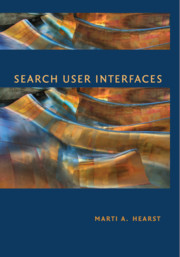Book contents
- Frontmatter
- Contents
- Preface
- 1 The Design of Search User Interfaces
- 2 The Evaluation of Search User Interfaces
- 3 Models of the Information Seeking Process
- 4 Query Specification
- 5 Presentation of Search Results
- 6 Query Reformulation
- 7 Supporting the Search Process
- 8 Integrating Navigation with Search
- 9 Personalization in Search
- 10 Information Visualization for Search Interfaces
- 11 Information Visualization for Text Analysis
- 12 Emerging Trends in Search Interfaces
- Appendix: Additional Copyright Notices
- Bibliography
- Index
- Author Index
- Plate section
6 - Query Reformulation
Published online by Cambridge University Press: 05 March 2013
- Frontmatter
- Contents
- Preface
- 1 The Design of Search User Interfaces
- 2 The Evaluation of Search User Interfaces
- 3 Models of the Information Seeking Process
- 4 Query Specification
- 5 Presentation of Search Results
- 6 Query Reformulation
- 7 Supporting the Search Process
- 8 Integrating Navigation with Search
- 9 Personalization in Search
- 10 Information Visualization for Search Interfaces
- 11 Information Visualization for Text Analysis
- 12 Emerging Trends in Search Interfaces
- Appendix: Additional Copyright Notices
- Bibliography
- Index
- Author Index
- Plate section
Summary
And as noted in Chapter 3, a common search strategy is for the user to first issue a general query, then look at a few results, and if the desired information is not found, to make changes to the query in an attempt to improve the results. This cycle is repeated until the user is satisfied or gives up. The previous two chapters discussed interfaces for query specification and presentation of search results. This chapter discusses the query reformulation step.
The Need for Reformulation
Examination of search engine query logs suggests a high frequency of query reformulation. One study by Jansen et al. (2005) analyzed 3 million records from a 24 hour snapshot of Web logs taken in 2002 from the AltaVista search engine. (The search activity was partitioned into sessions separated by periods of inactivity, and no effort was made to determine if users searched for more than one topic during a session. 72% of the sessions were less than five minutes long, and so one-topic-per-session is a reasonable, if noisy, estimate.) The analysis found that the proportion of users who modified queries was 52%, with 32% issuing 3 or more queries within the session. Other studies show similar proportions of refinements, thus supporting the assertion that query reformulation is a common part of the search process.
Good tools are needed to aid in the query formulation process. At times, when a searcher chooses a way to express an information need that does not successfully match relevant documents, the searcher becomes reluctant to radically modify their original query and stays stuck on the original formulation.
- Type
- Chapter
- Information
- Search User Interfaces , pp. 141 - 156Publisher: Cambridge University PressPrint publication year: 2009



